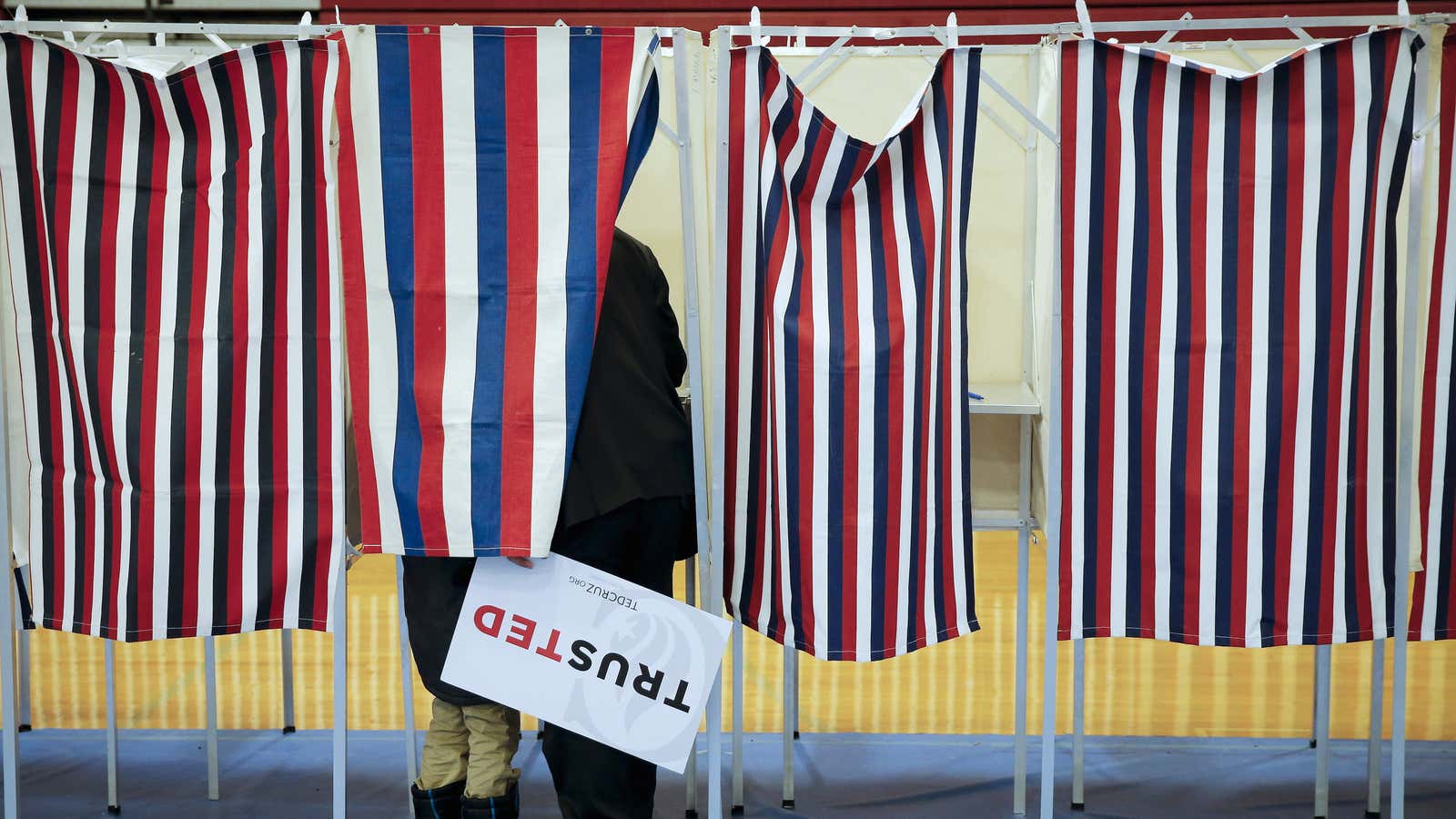As happens every four years, my Facebook feed has been cluttered with US presidential election memes for months now. There’s the fabulous “Who wore it better?” juxtaposing the (now presumptive Republican nominee) Donald Trump with a hairy ear of corn, the “Things I trust more than Ted Cruz” meme, and my personal favorite, the Toy Story meme with Buzz telling Woody, “Election posts, election posts everywhere.”
This year, though, the tenor of election-related posts seems different. In the past, the most frustrating posts were those imploring people not to vote because the two major parties are the same. This argument is overly reductionist and easy to debunk. This cycle, however, I’ve started seeing a proliferation of posts to the effect of: “I won’t vote in the general election unless my candidate wins the primary.”
It’s bizarre to me that there’s a contingent of people—and, admittedly, a lot of them seem to be on the left—proudly proclaiming that they’ll only vote in the general election if their preferred candidate wins in the primaries. If not, they’ll take their toys and go home, with the political foresight of a four-year-old.I can’t even begin to understand this thinking. Neither, most likely, can the more than five million adult American citizens who are legally prevented from voting.
Until 2014, I was one of them. Four years earlier, I’d been arrested on a drug charge and sent to state prison. I served my time and paid my dues to society. I got out just a few weeks before the 2012 presidential elections—not that I could vote in them.
Before my incarceration, I made it to the local voting booth for presidential elections but, by and large, I took my voting rights for granted. After serving 21 months behind bars, though, I had a very different view of the power of the ballot box. For one thing, my own freedom had become dependent in part on the opinions of local elected officials.
When the Rockefeller Laws—some of the nation’s most draconian drug policies—were enacted in 1973, they were named after the man who championed them, New York’s Republican governor, Nelson A. Rockefeller. Those laws called for hefty sentences—15 to life for possession of four or more ounces of narcotics, initially. Had I been arrested under the original laws, I’d still be behind bars, and the possibility of parole would still be a distant speck on the horizon.
Fortunately, the Rockefeller Laws were dialed back incrementally by lawmakers in 1979, 2004, and 2009. But what if those politicians didn’t make it to the state Senate because voters on one side of the aisle decided to stay home? Quite possibly, I’d still be in prison, costing taxpayers more than $60,000 a year instead of paying taxes and contributing to society again.
Since 2014, the year my parole ended, I also became eligible to vote again. I am lucky enough to live in a state where felons’ voting rights are restored once their parole or probation terms are completed. But that’s not the case everywhere, even as more and more states are starting to come around.
Last month, Virginia governor Terry McAuliffe signed an executive order restoring voting rights to some 200,000 felons who’d completed their prison and parole time. State Republicans say they’re planning to challenge the move, calling it “overreach of the executive branch.” Sadly, it seems that partisan politics could play a big role in whether men and women who’ve served their time and paid their dues will ever get to play an active role in our democracy again. (Perhaps not surprisingly, studies have shown that ex-felons lean to the left once they’re released from prison.)
In theory, voting is a fundamental American practice. The GOP’s hallowed Constitution references the “right” to vote—but between voter ID laws and felon disenfranchisement—it seems to be treated more and more as a privilege.
You have to be pretty privileged to thumb your nose at the chance to vote. This year huge social and economic issues hang in the balance, including everything from immigration to abortion rights to trans rights. If none of those issues affect you personally, then count your blessings. But on behalf of the people who will be affected—some of whom are doubtless your friends and families—I’m urging all Americans to go vote this November. You may not always get the candidate you liked the most, but elections aren’t just about you.
That’s American democracy for you—an overly complicated process designed to force compromise in order to do the most good for the most amount of people. So this year, go out and pick the candidate who will be best for the country as a whole. We can’t always get exactly what we want, but that doesn’t mean we get to ruin it for everyone else.




